Reminiscing
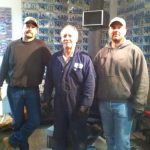
 Like most of the Schulenberg men, my brother-in-law Ron Schulenberg is a work-a-holic. When he isn’t working as a diesel mechanic at Wyoming Machinery, he is working on a car at his own house. This year Ron also put a roof on the family home and put up a fence around the yard. Like any work-a-holic, he spends an average of 16 working hours a day, and then comes in to spend time with his favorite people, his wife Rachel and his son Tucker, and the dogs of course. Weekends often find him working with his nephew, Barry or brother, Bob, both of whom are work-a-holics too. The men cut wood or work on cars. The main good news about all this for Rachel is the fact that she knows where to find him. That’s the way I always felt about Bob’s work.
Like most of the Schulenberg men, my brother-in-law Ron Schulenberg is a work-a-holic. When he isn’t working as a diesel mechanic at Wyoming Machinery, he is working on a car at his own house. This year Ron also put a roof on the family home and put up a fence around the yard. Like any work-a-holic, he spends an average of 16 working hours a day, and then comes in to spend time with his favorite people, his wife Rachel and his son Tucker, and the dogs of course. Weekends often find him working with his nephew, Barry or brother, Bob, both of whom are work-a-holics too. The men cut wood or work on cars. The main good news about all this for Rachel is the fact that she knows where to find him. That’s the way I always felt about Bob’s work.
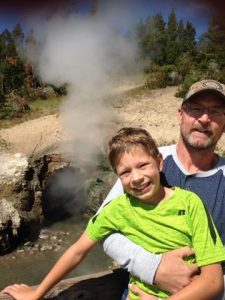
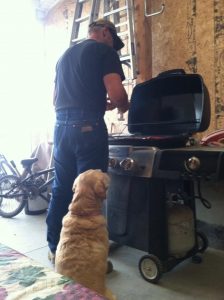
Ron loves grilling, and really knows his way around a barbeque grill. That seems to be another trait of the Schulenberg men…including my father-in-law, Walt Schulenberg, who was just like his sons and grandsons. Of course, these days, Ron has a helper with all his activities. His son Tucker, his sidekick, is right there doing whatever his dad is doing, be it working, playing, or grilling. They are best buddies, and they are perfectly happy to have each other to count on for help on their projects. It’s important to have an assistant for these things, and Tucker would rather be working with his dad, than almost anything else in the world.
While Ron is a work-a-holic, and like getting things done, he does like his relaxation time too. He enjoys 
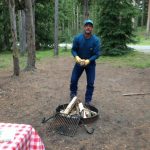 traveling. The family took a trip to New York a while back and really enjoyed Niagara Falls. Ron really enjoys his work, but the reality is that we work to make a better life for our family. Work is a means to an end…a better family life. I can’t picture Ron never getting out there and working…at least not until he is really, really old, but I think that if you ask Ron how he feels about the things he does in life, he would simply say, “I’d rather be camping!” Today is Ron’s birthday. Happy 50th birthday Ron!! Have a great day!! We love you!!
traveling. The family took a trip to New York a while back and really enjoyed Niagara Falls. Ron really enjoys his work, but the reality is that we work to make a better life for our family. Work is a means to an end…a better family life. I can’t picture Ron never getting out there and working…at least not until he is really, really old, but I think that if you ask Ron how he feels about the things he does in life, he would simply say, “I’d rather be camping!” Today is Ron’s birthday. Happy 50th birthday Ron!! Have a great day!! We love you!!
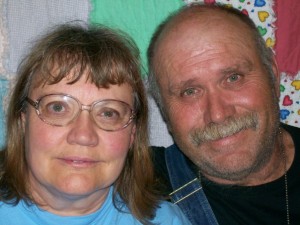
 My sister-in-law, Debbie Cook leads a pretty busy life. During the school year, she is the “bus driver” for her two youngest grandchildren, Easton Moore and Kaytlyn Griffith after school. The older kids, Weston Moore and Jala Satterwhite have activities that go on after school, so Debbie has just the little ones. Debbie likes to do special things for the grandkids, such as the brownies she made as a treat for Valentine’s Day. Of course, when its nice outside, there is a lot more that can be done, like going to the park, where they can run and play, which is probably to their parents liking too, because then they are more settled at night…or is does that only work on the little ones?
My sister-in-law, Debbie Cook leads a pretty busy life. During the school year, she is the “bus driver” for her two youngest grandchildren, Easton Moore and Kaytlyn Griffith after school. The older kids, Weston Moore and Jala Satterwhite have activities that go on after school, so Debbie has just the little ones. Debbie likes to do special things for the grandkids, such as the brownies she made as a treat for Valentine’s Day. Of course, when its nice outside, there is a lot more that can be done, like going to the park, where they can run and play, which is probably to their parents liking too, because then they are more settled at night…or is does that only work on the little ones?
Winter is a dreaded time for lots of people, an most especially for anyone who like to got camping. Debbie and her husband, Lynn love to go camping, and I think that they would move to the mountains if it weren’t for the fact that the kids and grandkids live in town. So the next best thing is family camping trip to the Big Horn Mountains. Their daughter Machelle, told me that going camping with the family every weekend is so peaceful and quiet and that they al really enjoy it. Machelle says it is like having a sleepover every weekend. Now when you think about it, which of us wouldn’t love to go home sometimes to relive the days of our youth…especially the ones when you and your siblings had a sleepover on the living room floor. That’s kind of how it feels to the family when they are all camping together in the beauty of the mountains.
Her family is the most important thing to Debbie. She loves being around the grandchildren, and especially having them all want to go camping together. It’s like taking weekly vacations together all your life. Most 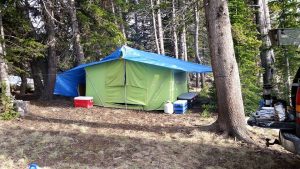
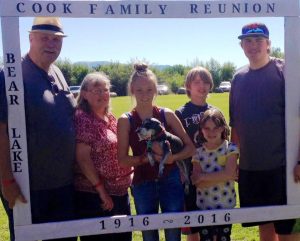 people quit taking together vacations when they get married, so it’s something special. I suppose that with the next generation coming of age, things are likely to change. When the grandkids are driving and working, they can’t always go along on the fun stuff, and they are old enough to stay alone, so things slowly change. Hopefully it doesn’t change too fast. Today is Debbie’s birthday. Happy birthday Debbie!! Have a great day!! We love you!!
people quit taking together vacations when they get married, so it’s something special. I suppose that with the next generation coming of age, things are likely to change. When the grandkids are driving and working, they can’t always go along on the fun stuff, and they are old enough to stay alone, so things slowly change. Hopefully it doesn’t change too fast. Today is Debbie’s birthday. Happy birthday Debbie!! Have a great day!! We love you!!
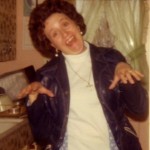
 As the three year mark since my mom, Collene Spencer went to Heaven arrives, I realize more and more how many time I have wanted to go to her and ask a question, get her advise, or just hear what she thought of my most recent story. Mom was, after all, my biggest fan. It didn’t matter what I wrote about, she liked it. And so often, she was part of it. She answered my many questions about the family, told me the inspirational things that happened, or the funny things her siblings would dream up. Hearing her talk about it all made me feel like I was there watching her and her siblings growing up. I could feel the coziness of my grandparents house, and hear the laughter of the kids in the kitchen as they did the dishes or helped with cooking the evening meal. Mom created that exclusive viewing for me, and I have felt very privileged to have been able to take that little tour into her history with her. Now that she is in Heaven, I find myself with more questions to ask her, and I really wish that Heaven had a telephone, so I could hear her voice and ask her the things that I want to know, because in Heaven, our minds have perfect recall, so the stories would be even more rich with detail.
As the three year mark since my mom, Collene Spencer went to Heaven arrives, I realize more and more how many time I have wanted to go to her and ask a question, get her advise, or just hear what she thought of my most recent story. Mom was, after all, my biggest fan. It didn’t matter what I wrote about, she liked it. And so often, she was part of it. She answered my many questions about the family, told me the inspirational things that happened, or the funny things her siblings would dream up. Hearing her talk about it all made me feel like I was there watching her and her siblings growing up. I could feel the coziness of my grandparents house, and hear the laughter of the kids in the kitchen as they did the dishes or helped with cooking the evening meal. Mom created that exclusive viewing for me, and I have felt very privileged to have been able to take that little tour into her history with her. Now that she is in Heaven, I find myself with more questions to ask her, and I really wish that Heaven had a telephone, so I could hear her voice and ask her the things that I want to know, because in Heaven, our minds have perfect recall, so the stories would be even more rich with detail.
Of course, the telephone call would not be just to ask her the many questions I still have, but also to hear her voice again, and my dad’s voice too. It has been so very long since I have heard their sweet voices, and I think they are among the things I miss the most. Of course, their faces, and really their person, but their voices are the essence of who they were. Thankfully, God has given me a clear memory, and in my memory files, their voices are stored. I can hear Mom’s laugh, along with her way of being just a little bit goofy, and Dad’s teasing, which had a way of driving Mom crazy…and of course, their life lessons…which is probably a nice way of talking about the many times they had to discipline me. Sometimes, I think I might have been their biggest challenge, and I believe my sisters would agree. They have often wondered how I made it to adulthood. All those things went into the life our parents created for us, and I wish every day that we could have them back. I wouldn’t want to go back in time exactly, but rather I wish that they could have continued on into what for them would have been the future. I would love for them to meet the new little family additions they have now. We have added lots of babies, and there are more of them on the way. They have four great great grandchildren now, and one more on the way. They loved those babies, and I wish they could have seen these great great grandbabies. Their legacy continues. If Heaven had a telephone, we could call and let them talk to these 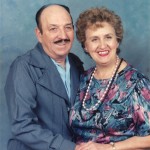
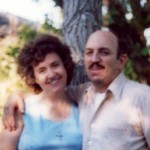 precious great grandbabies and great great grandbabies. Oh, how I wish we could call them. There is so much I would like to tell them. If only Heaven had a telephone. While I miss you so much on this day, in particular, Mom, I know that you and Dad are having the most amazing time in Heaven, and you can’t wait for all of us to get there…where we will realize why Heaven doesn’t have a telephone. When we are all there, we will never need telephones again. What an awesome day that will be. We love and miss you Mom…and Dad too. See you both someday soon…and we can hardly wait.
precious great grandbabies and great great grandbabies. Oh, how I wish we could call them. There is so much I would like to tell them. If only Heaven had a telephone. While I miss you so much on this day, in particular, Mom, I know that you and Dad are having the most amazing time in Heaven, and you can’t wait for all of us to get there…where we will realize why Heaven doesn’t have a telephone. When we are all there, we will never need telephones again. What an awesome day that will be. We love and miss you Mom…and Dad too. See you both someday soon…and we can hardly wait.
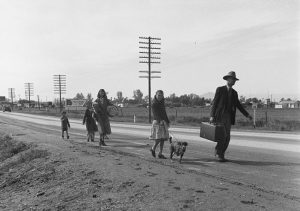
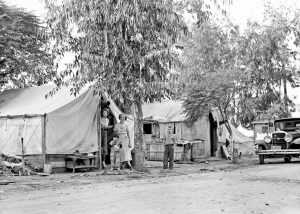 The “Dust Bowl” was an environmental disaster that hit the Midwest in the 1930s. A combination of a severe water shortage and harsh farming techniques caused the disaster. Some scientists believe it was the worst drought in North America in 300 years. The lack of rain killed the crops that kept the soil in place. When winds blew, they raised enormous clouds of dust. It deposited mounds of dirt on everything, even covering houses. With the Dust Bow came the failure of many farms in the Midwest, and the people had no choice but to move, in order to find a way to make a living.
The “Dust Bowl” was an environmental disaster that hit the Midwest in the 1930s. A combination of a severe water shortage and harsh farming techniques caused the disaster. Some scientists believe it was the worst drought in North America in 300 years. The lack of rain killed the crops that kept the soil in place. When winds blew, they raised enormous clouds of dust. It deposited mounds of dirt on everything, even covering houses. With the Dust Bow came the failure of many farms in the Midwest, and the people had no choice but to move, in order to find a way to make a living.
I suppose that the invasion that followed might have been similar to the current refugees. It wasn’t just one family that moved, but hundreds of families. Los Angeles Police Chief James E. Davis, seeking to halt the “invasion” of dust-bowl Depression refugees in February, 1936, declared a “Bum Blockade” to stop the mass emigration of poverty stricken families fleeing from the dust-torn states of the Midwest. These days, he would have met with severe criticism, not so much for the blockade, as for the name of the blockade.
By 1934, 75% of the United States was severely affected by this terrible drought. The region most affected was the Great Plains, and included more than 100 million acres, centered in Oklahoma, the Texas Panhandle, Kansas, and parts of Colorado and New Mexico. These millions of acres of farmland became useless and soon, hundreds of thousands of people were forced to leave their homes. Many of these destitute families packed up their belongings and migrated west, hoping to find work and a better life, about 200,000 of which were California bound. Instead of finding the promised land of their dreams, however, they found that the available labor pool was vastly disproportionate to the number of job openings that could be filled. Migrants who found employment soon learned that this surplus of workers caused a significant reduction in the going wage rate, and even when the entire family worked, they were unable to support themselves.
Many set up “ditchbank” camps along irrigation canals in the farmers’ fields, which brought with them poor sanitary conditions and created a public health problem. And, of those who could find work in agriculture, it did not put an end to their travels. Instead, their lives were characterized by transience, if they wanted to maintain a steady income, which required them to follow the various harvests around the state. In the meantime, California was overwhelmed, trying to figure out how to absorb as many as 6,000 migrants crossing its borders daily. Also feeling the effects of the Depression, California infrastructures were already overburdened, and the steady stream of newly arriving migrants was more than the system could bear. Though these refugees came from a number of states, Californians often lumped them together as “Okies” or “Arkies,” who became the butt of derogatory jokes and the focus of political campaigns in which candidates made them the scapegoat for a shattered economy. They were accused of many crimes, as well as shiftlessness, lack of ambition, school overcrowding and stealing jobs from native Californians.
California’s Indigent Act was passed in 1933, which made it a crime to bring indigent persons into the state, Davis contended that his men needed no special approval because “any officer has the authority to enforce the state law.” Asking border-county sheriffs to deputize his officers, most complied. However, some refused, including Modoc County, who forced 14 LAPD officers to leave after they turned away local residents trying to 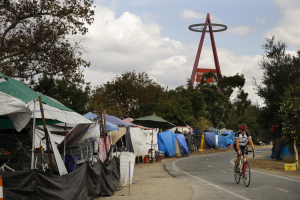
 return home. On August 24, 1935, the Los Angeles Herald-Express ran an article warning emigrants to stay away from California. It read: Stay Away From California: Warning To Transient Hordes. Those days were very different from the California of today, and not in a good way. I don’t agree with derogatory name calling, but common sense tells us that sometimes you have to try to stop a flood, even if it’s a flood of people.
return home. On August 24, 1935, the Los Angeles Herald-Express ran an article warning emigrants to stay away from California. It read: Stay Away From California: Warning To Transient Hordes. Those days were very different from the California of today, and not in a good way. I don’t agree with derogatory name calling, but common sense tells us that sometimes you have to try to stop a flood, even if it’s a flood of people.
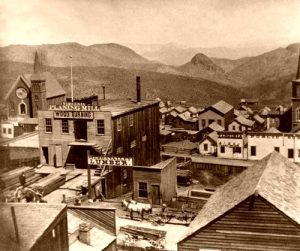 Gold brought miners from the east to multiple areas of the American west…all looking to make their fortune in the gold fields. Unfortunately, it wasn’t just gold and silver miners who flooded Nevada, or any other gold rush area, in the late 1800s in search of their fortunes. The West was indeed wild, and it and the gold also attracted plenty of outlaws and bandits, looking to make their fortune too, but not willing to do the work to mine the gold. Nevada, like other states of the Wild West, attracted its share of outlaws and bandits. One such man, named Andrew Jackson “Jack” Davis, led a gang of thieves involved in robbing stage stops, bullion wagons, and trains in Western Nevada.
Gold brought miners from the east to multiple areas of the American west…all looking to make their fortune in the gold fields. Unfortunately, it wasn’t just gold and silver miners who flooded Nevada, or any other gold rush area, in the late 1800s in search of their fortunes. The West was indeed wild, and it and the gold also attracted plenty of outlaws and bandits, looking to make their fortune too, but not willing to do the work to mine the gold. Nevada, like other states of the Wild West, attracted its share of outlaws and bandits. One such man, named Andrew Jackson “Jack” Davis, led a gang of thieves involved in robbing stage stops, bullion wagons, and trains in Western Nevada.
Davis first arrived in the area in 1859. His plan was to lead two different lives, 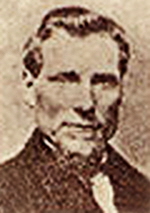 and he carried it out quite well. To the outside world he looked like a legitimate business man when he set up a livery stable in Gold Hill. However, in his “spare” time, Davis and his gang took to the bandit road, taking gold and bullion from any source they could find. Davis built a small bullion mill in Six Mile Canyon east of Virginia City, Nevada. There, he melted down his stolen gold, selling it as legitimate gold bars. He then buried his proceeds so people would not notice or catch on to how wealthy he really was, because after all, how rich could a livery stable owner be.
and he carried it out quite well. To the outside world he looked like a legitimate business man when he set up a livery stable in Gold Hill. However, in his “spare” time, Davis and his gang took to the bandit road, taking gold and bullion from any source they could find. Davis built a small bullion mill in Six Mile Canyon east of Virginia City, Nevada. There, he melted down his stolen gold, selling it as legitimate gold bars. He then buried his proceeds so people would not notice or catch on to how wealthy he really was, because after all, how rich could a livery stable owner be.
On November 4, 1870 the gang robbed the express car of the Central Pacific Railroad near Verdi, Nevada taking some $40,000 in gold coins and bullion. Pursued by lawmen, they were said to have buried the stolen cache along the north bank of the Truckee River, between Reno and Laughton’s Hot Springs west of town, near the site of the long-abandoned River Inn. The entire gang was apprehended and all were sent to the Nevada State Prison, but would not tell where they had hidden their stolen loot. In 1875, Davis was paroled but two 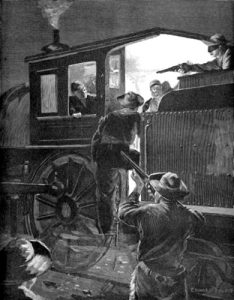 years later, he was shot in the back during a Wells Fargo stagecoach robbery near Warm Springs, Nevada. If Davis ever returned for his cache is unknown, but many believe it is still hidden in Six-Mile Canyon or in the vicinity of the Truckee River. Treasure hunters have long searched these two locations without success. If the money is still there, it may never be found.
years later, he was shot in the back during a Wells Fargo stagecoach robbery near Warm Springs, Nevada. If Davis ever returned for his cache is unknown, but many believe it is still hidden in Six-Mile Canyon or in the vicinity of the Truckee River. Treasure hunters have long searched these two locations without success. If the money is still there, it may never be found.
Another legend abounds that the ghost of Jack Davis protects his treasure in the canyon. Many who have looked for the treasure have been frightened away by the white screaming phantom that is said to sometimes sprout wings and rise into the air. I suppose some would say I shouldn’t be so skeptical, but since I don’t believe in ghosts, my guess is that people just get freaked out, and their imagination runs away with them. Nevertheless, those who think they have seen what they believe to be a ghost, would not be persuaded by my disbelief in same.
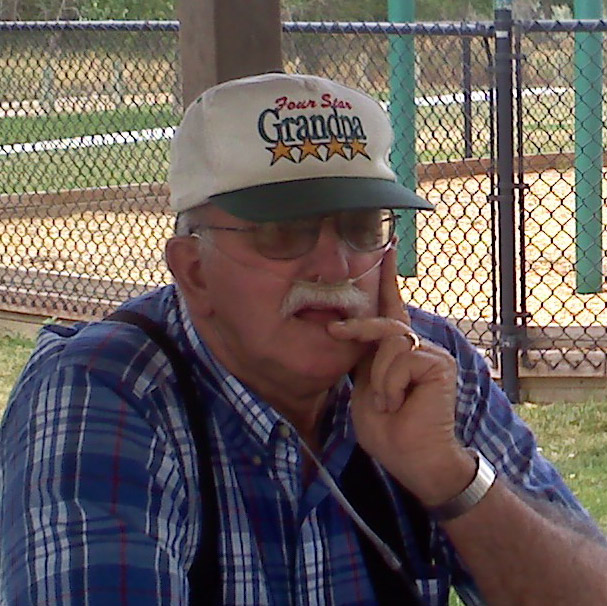 My uncle, Jack McDaniels was such a sweet man. He cared about everyone he knew. He was a friend to all, and all of the kids in the family loved him. He was first and foremost, a family man, and took care of anyone who needed it. For many years, his mother lived just a few steps away in a little trailer house, basically in the front yard of the family home. It kept her close to the family, and he could take care of her.
My uncle, Jack McDaniels was such a sweet man. He cared about everyone he knew. He was a friend to all, and all of the kids in the family loved him. He was first and foremost, a family man, and took care of anyone who needed it. For many years, his mother lived just a few steps away in a little trailer house, basically in the front yard of the family home. It kept her close to the family, and he could take care of her.
Like a lot of men, Uncle Jack loved tinkering with cars. In his younger days, he drive a stick car, and once that is in your blood, it follows that car races are something that never really gets out of your system. Uncle Jack was no different. I’m sure there were many days when the television at the family home was locked into one car race or another. I don’t know how my Aunt Bonnie, his wife, felt about car races, but it could have very easily been a matter of like it or go find something else to do. I rather think that she ended up liking it, because they loved spending time together. You rarely saw one without the other, 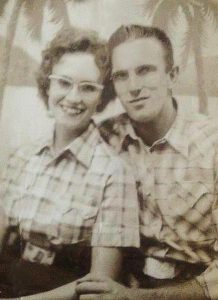 at least on his days off.
at least on his days off.
Uncle Jack was a walking Casper Historian, which is something I wish I had known years ago. The stories he could have shared with me would have enriched my blog greatly, I’m sure. He wasn’t a pushy person though, and so unless you asked, he probably didn’t feel like he could intrude. If only I had known to ask.
Along with history and car racing, Uncle Jack loved hunting, fishing, and camping, making him a true Wyoming outdoorsman…not surprising since he was born and raised right here in Casper, Wyoming. He grew up with all the great things there are to do here, and he wanted to show his family all the wonderful things he had been able to do as a kid. He wanted them to have the same kind of amazing life he did. Today would have been Uncle Jack’s 80th birthday. Happy birthday in Heaven Uncle Jack. You were a great man. We love and miss you very much.
 My grand nephew, Easton Moore is a busy guy. He is always on the go. Right now, he and his family are into Nerf Guns. They love to have Nerf battles, and the family very likely used sneak attacks to gain a little leverage. Basically, you just never knew when the attack was going to come, until the Nerf bullet hit you. Easton really likes the Nerf gun, and he is very interested in how they work, so he likes to take them apart and modify them so they will shoot further. It’s not surprising that he like to find out how his Nerf gun works, because it is something his Dad, Steve Moore loves to do too. Building, dismantling, and learning all about the guns they use, real and Nerf, is a hobby the Moore family has been into for quite a while now, and since Easton has grown up in that atmosphere, he is completely comfortable with the inner workings of a gun. So, for a new challenge, his mom bought a bag of rubber bands, and over the last few weeks there has been a new war going on in the Moore house. Easton is getting good at shooting them, but his arm was all red from learning how to shoot them. Still, he never gave up.
My grand nephew, Easton Moore is a busy guy. He is always on the go. Right now, he and his family are into Nerf Guns. They love to have Nerf battles, and the family very likely used sneak attacks to gain a little leverage. Basically, you just never knew when the attack was going to come, until the Nerf bullet hit you. Easton really likes the Nerf gun, and he is very interested in how they work, so he likes to take them apart and modify them so they will shoot further. It’s not surprising that he like to find out how his Nerf gun works, because it is something his Dad, Steve Moore loves to do too. Building, dismantling, and learning all about the guns they use, real and Nerf, is a hobby the Moore family has been into for quite a while now, and since Easton has grown up in that atmosphere, he is completely comfortable with the inner workings of a gun. So, for a new challenge, his mom bought a bag of rubber bands, and over the last few weeks there has been a new war going on in the Moore house. Easton is getting good at shooting them, but his arm was all red from learning how to shoot them. Still, he never gave up.
Easton really likes building things too. Legos has been a starting point for him, and something he continues to like to do. The schools these days have embrace the Lego craze, and added robotics, giving the kids new activities to stir up the creative side of their brains. They learn how to make their robot be the best functioning one in the competition. Who would have thought that a toy we have all played with could morph into a way to teach the kids about architecture and mechanics? Nevertheless, Legos have done this, and it is really a cool thing for a kid like Easton, who really loves to find out just how these things work.
 Easton loves sports. He played football again this year and is thinking about tennis in the spring. He is an active kid, who doesn’t much like sitting still, so sports was the next logical idea for him, but he has a few other activities up his sleeve too. He has helped his grandparents with their rentals and had made a little cash. He worked with PESCO which is the concessions stand for games and after school and made money doing that. Easton has decided that he doesn’t have that much time to save money for the car he will need in a couple of years when he turns 16, now if his mom could just slow down time a little bit, she would feel better, because, she doesn’t want him growing up. Today is Easton’s 14th birthday. Happy birthday Easton!! Have a great day!! We love you!!
Easton loves sports. He played football again this year and is thinking about tennis in the spring. He is an active kid, who doesn’t much like sitting still, so sports was the next logical idea for him, but he has a few other activities up his sleeve too. He has helped his grandparents with their rentals and had made a little cash. He worked with PESCO which is the concessions stand for games and after school and made money doing that. Easton has decided that he doesn’t have that much time to save money for the car he will need in a couple of years when he turns 16, now if his mom could just slow down time a little bit, she would feel better, because, she doesn’t want him growing up. Today is Easton’s 14th birthday. Happy birthday Easton!! Have a great day!! We love you!!
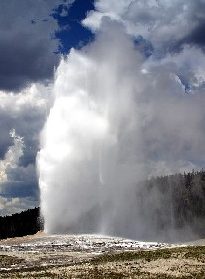 It’s amazing how much we can fear the things we don’t understand. As an example, the Indians who lived around the geysers of Yellowstone. The early Indians thought that the hissing and thundering were the voices of evil spirits. Even though the geysers were frightening, the Indians regarded the mountains at the head of the river as the crest of the world, and the man who gained their summits could see the happy hunting-grounds below, brightened with the homes of the blessed. They loved this land in which their fathers had hunted, and when they were driven back from the settlements the Crows took refuge in what is now Yellowstone Park, but they were still not safe.
It’s amazing how much we can fear the things we don’t understand. As an example, the Indians who lived around the geysers of Yellowstone. The early Indians thought that the hissing and thundering were the voices of evil spirits. Even though the geysers were frightening, the Indians regarded the mountains at the head of the river as the crest of the world, and the man who gained their summits could see the happy hunting-grounds below, brightened with the homes of the blessed. They loved this land in which their fathers had hunted, and when they were driven back from the settlements the Crows took refuge in what is now Yellowstone Park, but they were still not safe.
The soldiers pursued them, intent on avenging acts that the red men had committed while they were being so wrongly mistreated. A small group of the original fugitive band gathered at the head of that mighty rift in the earth known as the Grand Canyon of the Yellowstone…a group that had succeeded in escaping the bullets of the soldiers, and with great courage they resolved to die rather than be taken and carried away to be held in a distant prison. They built a raft and laced it on the river at the foot of the upper fall, and for a few days they 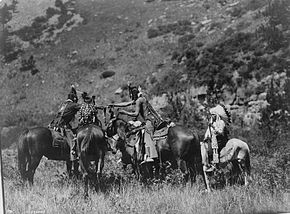 enjoyed the plenty and peace that were their privilege in former times. A short-lived peace, however, for one morning they are awakened by the rifle fire, and they knew that the troops are upon them.
enjoyed the plenty and peace that were their privilege in former times. A short-lived peace, however, for one morning they are awakened by the rifle fire, and they knew that the troops are upon them.
Boarding their raft they thrust it toward the middle of the stream, perhaps with the idea of making it to the opposite shore. If that was their intent, the rapid current kept them from attaining their goal. A few among them had guns, but their bullets had only a slight effect at the troops, who stood watching in amazement from the shore. The soldiers didn’t fire, but watched, with something like dread, the descent of the raft as it passes into the current. Then, with many a turn and pitch, it whirled on faster and faster. The death-song rises triumphant above the lash of the waves and that distant but awful booming that is to be heard in the 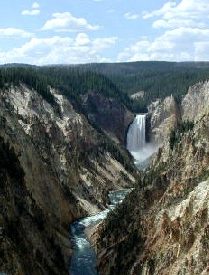 canyon. Every red man has his face turned toward the foe with a look of defiance, and the tones of the death-chant have in them something of mockery and hate. The Indians went defiantly to their deaths, refusing to show the slightest amount of fear.
canyon. Every red man has his face turned toward the foe with a look of defiance, and the tones of the death-chant have in them something of mockery and hate. The Indians went defiantly to their deaths, refusing to show the slightest amount of fear.
The raft was now between the jaws of the rocks. Beyond and below are vast walls, shelving toward the floor of the gulf a thousand feet below. The beauty of the falls will be their last vision…brilliant colors shining in the sun of morning that sheds as peaceful a light on wood and hill. They believe they are heading to a place where humans don’t shoot human, and where they will be free again. The raft was galloping through the foam like a racehorse, and even the hardened soldiers could not hold back the shudder as they imagined the fate of the brave Indians. Now the brink is reached. The raft tips toward the gulf, and with a cry of triumph the red men are launched over the cataract, into the bellowing chasm, and the rocky floor that waited below.
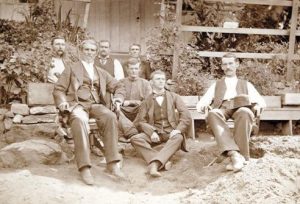 When the ranchers began to take over the western plains, there were those who were honest, and those who were scoundrels. One of those scoundrels was Albert John Bothwell (1855-1928), who was one of the main instigators of the Johnson County War in Wyoming. Bothwell was born in Iowa and migrated to Wyoming, where he quickly became one of the most prosperous cattlemen in Sweetwater County. Bothwell was an arrogant man, who tended to take what he wanted. He had been grazing his cattle on unclaimed homestead land, which was not his to use, but as I said, he tended to take what he wanted. When James Averell and his girlfriend, Ellen Watson came along in 1886, and filed a claim on the land Bothwell had been using, they found that he had gone so far as to illegally fence much of their land with barbed wire. In his mind, Bothwell
When the ranchers began to take over the western plains, there were those who were honest, and those who were scoundrels. One of those scoundrels was Albert John Bothwell (1855-1928), who was one of the main instigators of the Johnson County War in Wyoming. Bothwell was born in Iowa and migrated to Wyoming, where he quickly became one of the most prosperous cattlemen in Sweetwater County. Bothwell was an arrogant man, who tended to take what he wanted. He had been grazing his cattle on unclaimed homestead land, which was not his to use, but as I said, he tended to take what he wanted. When James Averell and his girlfriend, Ellen Watson came along in 1886, and filed a claim on the land Bothwell had been using, they found that he had gone so far as to illegally fence much of their land with barbed wire. In his mind, Bothwell 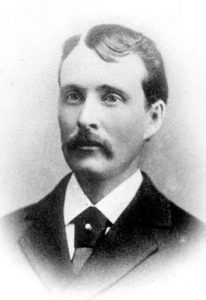 had decided that the land was somehow his, that his needs were more important, or that no one would ever put in a claim on it, at least not if he had any say in the matter.
had decided that the land was somehow his, that his needs were more important, or that no one would ever put in a claim on it, at least not if he had any say in the matter.
When Averell and Watson moved onto the land, Bothwell’s illegal use of the property came to light, and of course, led to repeated disputes between Bothwell and the young couple. Bothwell, was a powerful man, as many cattle barons are. They have men to keep what they believe to be theirs protected. The problem here was that the land wasn’t his…it belonged to Averell and Watson. When Averell wrote to the Casper Daily Mail criticizing Bothwell and claiming that the cattle barons had too much power, Bothwell retaliated by claiming that Averell and Watson were stealing his cattle. Dubbing Watson with the moniker of “Cattle Kate,” he also accused her of being a prostitute who sometimes accepted stolen cattle in payment.
As the dispute continued to rage over the next several months, Bothwell convinced other area ranchers of Averell and Watson’s guilt, and on July 20, 1889, he convinced five other men to help him hang the pair at a 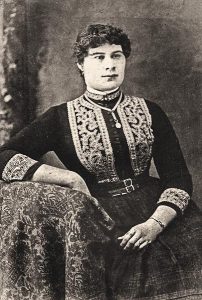 small canyon by the Sweetwater River. Though the men were charged with murder, key witnesses began to mysteriously die or disappear and all of them were acquitted. Both Averell and “Cattle Kate” were “tried” in the press, which was owned or influenced by the cattle barons, and branded as “outlaws.” Bothwell later acquired both homesteads of the murdered victims.
small canyon by the Sweetwater River. Though the men were charged with murder, key witnesses began to mysteriously die or disappear and all of them were acquitted. Both Averell and “Cattle Kate” were “tried” in the press, which was owned or influenced by the cattle barons, and branded as “outlaws.” Bothwell later acquired both homesteads of the murdered victims.
After the dust settled and many years had passed, re-investigations into the whole affair have found that most likely neither James Averell, nor his girlfriend Ellen “Cattle Kate” Watson, were guilty of any crime. In the meantime, this event, as well as several other similar events, led to the Johnson County War in Wyoming. Albert Bothwell, however, walked away free of any repercussion and continued to run his ranch until his retirement, when he moved to Los Angeles, California, where he died on March 1, 1928. No one was ever prosecuted for the murders of James Averell and Ellen Watson.
 As the world is watching the 2018 Winter Olympics, officially known as the XXIII Olympic Winter Games and commonly known as PyeongChang 2018, looking at the hope for gold in this group of young talented athletes, I have been thinking back to another group of young talented athletes…athletes that would never get the chance to realize their dreams. Yes, this group had won gold before, so they were not new to the world of competition, but their hopes of any future gold were crushed forever on February 15, 1961, when they were on their way to the 1961 World Figure Skating Championships in Prague, Czechoslovakia.
As the world is watching the 2018 Winter Olympics, officially known as the XXIII Olympic Winter Games and commonly known as PyeongChang 2018, looking at the hope for gold in this group of young talented athletes, I have been thinking back to another group of young talented athletes…athletes that would never get the chance to realize their dreams. Yes, this group had won gold before, so they were not new to the world of competition, but their hopes of any future gold were crushed forever on February 15, 1961, when they were on their way to the 1961 World Figure Skating Championships in Prague, Czechoslovakia.
On that day, the entire 18 member United States figure skating team, along with the 16 people who were accompanying them, which included family, friends, coaches and officials, as well as the crew and 38 people who were not with the figure skating team, died when the plane went down around 10am in clear weather while attempting to make a scheduled stopover landing at the Belgian National Airport in Brussels. One person on the ground, a farmer working in the field where the Boeing 707 crashed in Berg-Kampenhout, several miles from the airport, was killed by some shrapnel. Investigators were unable to 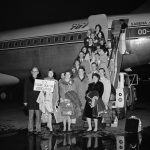 determine the cause of the crash, although mechanical difficulties were suspected.
determine the cause of the crash, although mechanical difficulties were suspected.
Killed in the crash was 16 year old Laurence Owen, who had won the U.S. Figure Skating Championship in the ladies’ division the previous month. She was featured on the February 13, 1961, cover of Sports Illustrated, which called her the “most exciting U.S. skater.” Bradley Long, the 1961 U.S. men’s champion, also perished in the crash, as did Maribel Owen (Laurence’s sister) and Dudley Richards, the 1961 U.S. pairs champions, and Diane Sherbloom and Larry Pierce, the 1961 U.S. ice dancing champions. Also killed was 49-year-old Maribel Vinson-Owen, a nine-time U.S. ladies’ champion and 1932 Olympic bronze medalist, who coached scores of skaters, including her daughters Maribel and Laurence, and Frank Carroll, who went on to coach the 2010 men’s Olympic gold medalist Evan Lysacek and nine-time U.S. champion Michelle Kwan. The crash was a tragedy that devastated the U.S. figure skating program and meant the loss of the country’s top skating talent. Prior to the crash, the U.S. had won the men’s gold medal at every Olympics since 1948…when Dick Button became the first American man to do so, while U.S. women had claimed Olympic gold in 1956 and 1960. After the crash, an American woman named Peggy Fleming would be the next to win, but she would not capture Olympic gold until 1968, while a U.S. man, Scott Hamilton would not do so until 1984. The incident was the 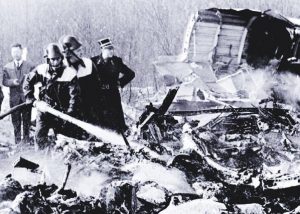 worst air disaster involving a U.S. sports team until November 1970, when 37 players on the Marshall University football team were killed in a plane crash in West Virginia.
worst air disaster involving a U.S. sports team until November 1970, when 37 players on the Marshall University football team were killed in a plane crash in West Virginia.
Shortly after the 1961 crash, the U.S. Figure Skating Memorial Fund was established. To date, it has provided financial assistance to thousands of elite American skaters. In 2011, the 50th anniversary of the tragedy, the 18 members of the 1961 figure skating team, along with the 16 people traveling with them to Prague, were inducted into the U.S. Figure Skating Hall of Fame in Colorado Springs, Colorado.

